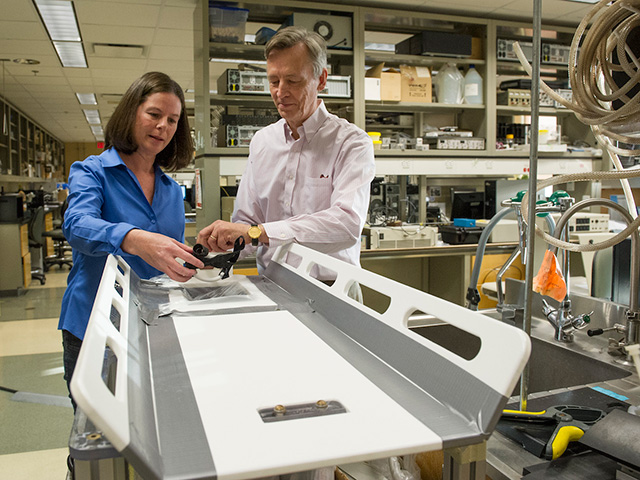Alzheimer’s disease

Drs. Isabelle Aubert and Kullervo Hynynen are collaborating on research into use of focused ultrasound to reduce pathology and improve cognitive function in Alzheimer's disease.
Alzheimer’s disease is the most common form of dementia. It has no cure and can affect all aspects of a person’s life, including how one thinks, acts and feels.
Treatments aimed at halting progression and restoring cognitive function are hindered by the blood-brain barrier, a layer of tightly packed cells that envelops the brain. The barrier serves as protection against toxins and infectious agents, but it also prevents therapies from reaching the brain.
Dr. Kullervo Hynynen, director of Physical Sciences at Sunnybrook Research Institute (SRI), showed that pairing low-intensity focused ultrasound with microbubbles injected into the bloodstream can for a short time open the blood-brain barrier for targeted drug delivery. He teamed up with Dr. Isabelle Aubert, a neuroscientist at SRI, to apply this finding in research into Alzheimer’s disease. When they tested this technique in preclinical models, they were able to deliver therapies directly into the brain. They also found that applying focused ultrasound alone, without drugs, rescued memory and stimulated growth of new brain cells.
Based on this seminal work, Sunnybrook launched the world’s first clinical trial to evaluate the safety and feasibility of using of focused ultrasound in people with Alzheimer’s disease. The co-principal investigators of the study, SRI scientists Drs. Sandra Black and Nir Lipsman, published the findings in Nature Communications in July 2018. They found that focused ultrasound can open the blood-brain barrier in a specific region safely, reversibly and repeatedly.
In 2019, the researchers started the second phase of the trial, of 30 people with Alzheimer’s disease. This trial seeks to confirm the technique can open the blood-brain barrier in multiple areas safely. The team, part of SRI’s Centre for Research in Image-Guided Therapeutics, will also test whether focused ultrasound alone—without drugs or antibodies—reduces buildup of toxic proteins like amyloid in the brain.



